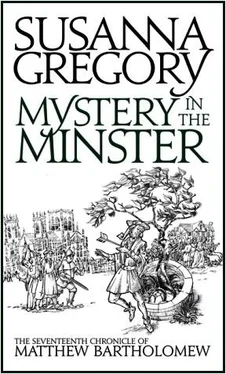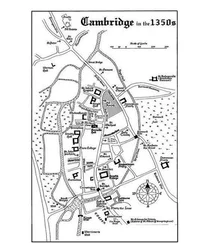Langelee’s grin of greeting faded, and Michael bridled, never one to tolerate criticism of his beloved University. Bartholomew and Radeford exchanged a pained glance, both sorry that the first exchange with their rivals for Huntington should be acrimonious.
‘I am Master of Michaelhouse,’ declared Langelee coldly. ‘It is by far the most scholarly College in the country, and we have the ear of the King.’
Neither claim was true: Michaelhouse was burdened with several members whose intellectual credentials were dubious, Langelee being one of them, while Bartholomew doubted the King was aware it even existed, let alone cared enough to give it his ear. Ellis evidently knew an empty boast when he heard it, because his moist lips curled into a sneer.
‘Then you must appeal to him for Huntington, because you shall not have it from us.’
‘But Zouche wanted it to go to Michaelhouse,’ objected Langelee, in the loudly belligerent voice he used to quell dissent in Fellows’ meetings. ‘And I am here to see his wishes fulfilled.’
The ape-like Cave stepped forward angrily, but Jafford laid a calming hand on his shoulder, and whispered something in his ear. It was too soft to hear, but it stopped his colleague’s advance.
‘Zouche never told me that he intended some distant foundation to inherit a local church,’ said Ellis disdainfully. ‘And there are no documents to support your claim.’
‘Myton heard it, too,’ countered Langelee hotly. ‘He…’
‘Myton is dead, as you know perfectly well,’ sneered Ellis, when the Master faltered. ‘So he is hardly in a position to testify on your behalf.’
‘We were sorry to lose him,’ said Jafford, more gentle than his sub-chanter. ‘He was venerable and discreet, and York has been a poorer place since he went to live with God.’
‘Murdered,’ said Cave with malicious satisfaction. ‘There were rumours that he was murdered.’
‘None of which were proven,’ snapped Langelee. ‘Sir William Longton told me. But never mind Myton. There will be written evidence that Zouche wanted Michaelhouse to have Huntington, because he was an efficient administrator, so it is just a question of locating it. Besides, I imagine there is no document to support your claim, either.’
‘No, but he always said we were to have it,’ argued Ellis. ‘It was understood.’
‘He changed his mind,’ said Langelee shortly. ‘He knew our College’s founder, and appreciated the fact that Michaelhouse needs money. Not like you vicars, who already own half of York.’
‘We are fortunate in that respect,’ acknowledged Ellis, licking his lips as if the notion was pleasurable to him. ‘But he always promised us Huntington, and it would be immoral to let it go to an absent landlord. We will prevail.’
‘You will have to kill me first,’ vowed Langelee. Bartholomew regarded him in alarm, not liking the way Cave’s eyes glittered, as if contemplating how he would go about it. Again, Jafford’s hand landed warningly on his colleague’s shoulder.
‘There is no need for hot words,’ said Radeford quietly. ‘I am sure we can come to a–’
‘We have hired the best lawyer in York,’ interrupted Ellis, cutting across him contemptuously. ‘So any “evidence” you produce will be very carefully examined.’
It was tantamount to saying that Michaelhouse would cheat, and even Bartholomew, slower than most to take umbrage, was offended. Meanwhile, Michael was outraged, while the blood drained from Langelee’s face and his fists clenched at his sides. Cave threw off Jafford’s restraining hand.
‘It must have been expensive to make this journey,’ he stated, addressing not Langelee, but his three Fellows. ‘But Huntington is poor, so even if you do win, it will be a long time before you recoup your losses. Your Master is not here to help Michaelhouse, but because he thinks to do Zouche’s bidding – a man he loved like a father.’
‘We are not here to quarrel,’ said Radeford quickly, raising his hand as Langelee stepped forward furiously. ‘And there is no reason why this matter cannot be settled amicably.’
‘Settled amicably?’ echoed Ellis, regarding the lawyer as if he was something unpleasant on his shoe. ‘The only settlement we shall accept is your unconditional withdrawal. But we cannot waste time here when we have important matters to attend. Good day to you.’
He turned on his heel and stalked away, pulling Cave with him. Jafford lingered, though.
‘I am sorry,’ he said with a pained smile. ‘The shock of seeing you here must have prompted those hot words. I am sure our next meeting will be more cordial.’
‘We must ensure it is,’ said Radeford, troubled. ‘The last thing we want is conflict.’
Jafford’s smile relaxed as he sensed Radeford’s sincerity. ‘I quite agree.’
With a brief bow, he hurried after his companions, fair curls bobbing. Michael glowered at his retreating back, then addressed Langelee. ‘Please tell me there is no truth in what Cave just said.’
‘Of course there is not,’ snapped Langelee. ‘I do want to see Zouche’s last wishes fulfilled, but we are not here because of him. We are here because Michaelhouse needs the money.’
‘Is this why you chose to enrol in Michaelhouse when you came to Cambridge?’ asked Bartholomew. ‘Because Zouche had a connection with it?’
‘No. I had forgotten about the bequest when I selected it as a place worthy of my talents. I only remembered two weeks ago, when Sir William wrote to tell me what the vicars were planning.’
‘Who is Sir William again?’ asked Radeford. ‘A friend?’
Langelee nodded. ‘He fought with Zouche and me at the Battle of Neville’s Cross, after which he was knighted. These days, he serves as the minster’s advocatus ecclesiae , which means he sees to its interests in various secular matters.’
‘And what about Cave’s other claim?’ persisted Michael. ‘That Huntington is poor. Is that true?’
The defiant expression on Langelee’s face told his colleagues all they needed to know. ‘Beggars cannot be choosers, Brother, and Michaelhouse is penniless. Even a poor church will benefit us.’
‘We had better visit the Abbot,’ said Bartholomew, before they could argue.
‘Yes,’ agreed Radeford, adding under his breath, ‘and then see about finding documents to prove our claim with all possible speed, because I do not want to miss the beginning of term for a pittance.’
Abbot Multone lived in a sumptuous two-storey building with a tiled roof. Its ground floor was given over to the clerks who carried out the complex business of running a foundation housing nigh on three hundred souls, while the top floor comprised a bedchamber, private chapel and solar. Oustwyk conducted the visitors to the solar, an elegant room with a large hearth and religious murals. A shelf of books graced one wall, and bowls of scented leaves were on the windowsills.
‘The Abbot must have gone to pray,’ said Oustwyk, finding the place empty, so hauling random tomes off the shelf and shoving them into the scholars’ hands. ‘He will not be long. Read these until I come back.’
‘Where are you going?’ asked Michael, startled that they were to be left alone.
‘Someone is knocking at the door downstairs,’ explained Oustwyk. ‘I cannot answer it and stay with you at the same time. So peruse these lovely books until I return. I am sure you will find them interesting. Most people do.’
‘I cannot imagine why,’ said Radeford, when the steward had gone. He gestured to the volume he had been given. ‘I was expecting a theological tract, but this is a list of tips for raising pigeons for the pot. Does anyone want to swap?’
Читать дальше












